This is a page within the www.staffshomeguard.co.uk website. To see full contents, go to SITE MAP.
MEMORIES
AND INFORMATION - SHROPSHIRE
Lt.-Col. F. H. LIDDELL, M.C.
(1st
SHROPSHIRE BATTALION,
HOME GUARD)
and
THE GREAT WAR
|
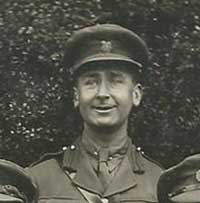 Most men who had survived the Great War kept their
experiences to themselves in later years, unwilling to
discuss them even with close family and preferring to
keep them deeply buried. Few left any written record. Most men who had survived the Great War kept their
experiences to themselves in later years, unwilling to
discuss them even with close family and preferring to
keep them deeply buried. Few left any written record.
Frank Liddell may well have been such a man. He
was a survivor of that conflict and left the Army
after the Armistice with the rank of Major, later
donning uniform again to command the
1st Shropshire
Battalion of the Home Guard. In the Great War he had
enlisted as a private from his Solihull home and had
served with the 15th Battalion of the
Royal
Warwickshire Regiment, one of the "Birmingham Pals"
units. Even though he left no written description of
his life in those years, fragments of his Great War
experience survive in a scrapbook he kept in later
life. One in particular leads us to a glimpse of what
such men went through and how they conducted
themselves in unimaginable circumstances. This
clue dates from 1933, 15 years after the end of
hostilities. It is a letter from a man named
Colin Harding.
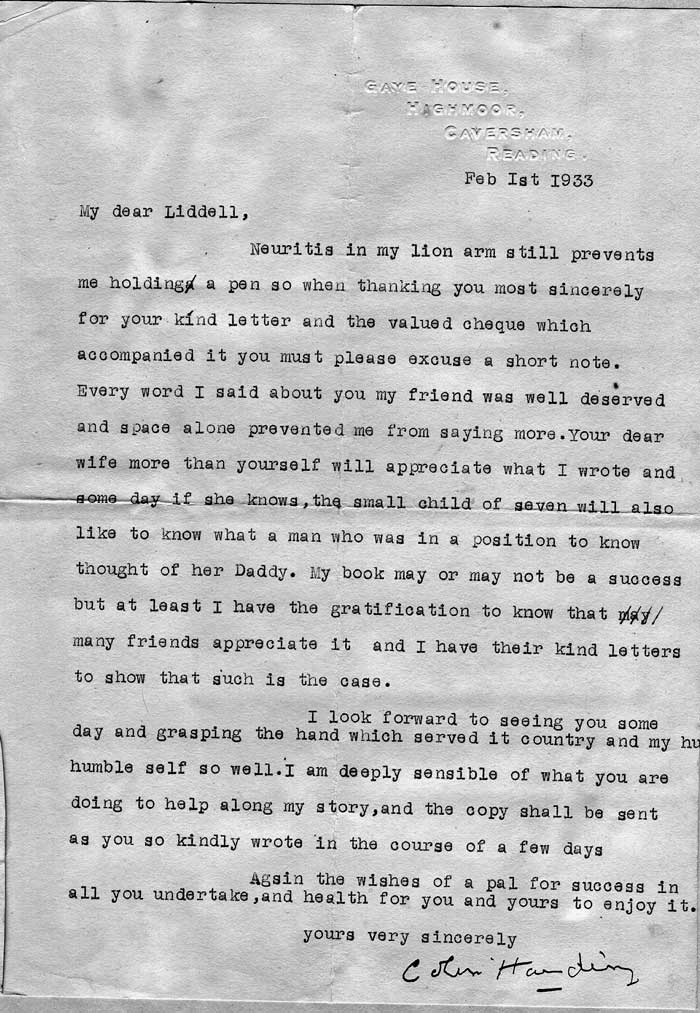
The correspondence refers to a book by Colin
Harding which had recently been published, "Far
Bugles", an autobiographical work which describes the
author's experiences - and especially of his
time as Commanding Officer of Frank Liddell's unit,
the 15th Battalion of the R.W.R. Happily, the
copy of this book which Frank had obviously requested
survives within his family to this day. A
transcription of relevant pages follows: they describe a time when
Frank had been commissioned and was serving as
adjutant. They give
a description of his bravery and loyalty
(his name is highlighted) and are quoted at length in
order to give an indication of the conditions and
circumstances which he endured in 1916 as just one
part of his war service.
Colin Harding
describes how the enormous losses incurred by
the British Army in 1915 led to everything
possible being done to hasten up the new army
which Lord Kitchener had promised.
It was in one of these
battalions in the new army that I was given
a command, shortly after I had said good-bye
to my old Regiment, The Second King Edward's
Horse.
I would like
to say a few words as regards the organisation
and personnel of my new battalion. In the
first place nearly every officer and man
hailed from the wonderful city of Birmingham,
and they formed one of the many battalions
which that loyal city had raised for the war.
Starting their training in a well-known park
near to Birmingham, the 15th Warwicks had
under capable instruction made rapid strides
towards efficiency by the time they arrived at
Codford in the late summer of 1915, and on my
arrival at Codford it was with great pleasure
I found the mess full of keen, smart and
well-educated officers.........
The 15th Battalion found itself on the Somme
in July 1916 not long after the fateful first
day of the attack which led to 60,000
casualties......
Although
when my Battalion arrived to participate in
the Battle of the Somme, the fighting was not
so severe as it was on the first day of the
attack, the scene as I shall briefly describe
it was a veritable shambles.
We first
took up a position close to High Wood, where
we were bombarded eventide and early morn, and
by way of a change deluged with "tear shells"
in mid-day. So intense was the enemy's
bombardment that the trenches which we were
supposed to hold were smashed to smithereens
and the losses of our Brigade were enormous.
Owing to the incessant artillery lire, it
was almost impossible to collect or evacuate
our wounded. The dying groans of a gallant lad
shot through the abdomen, waiting to be
removed by the intrepid and overworked
stretcher-bearers is still vivid in my memory.
The cry of a horse who, with blood pouring
from a fractured thigh, with harness dangling
and foaming mouth, rushing mad with pain
hither and thither is ever by me to be
remembered. He, too, poor thing, had also done
his duty and the gun which he helped to drag
vomited death and destruction at close range
on the enemy's lines. Such were some of the
scenes which we endured during the Somme
Battle of July, 1916. Yes, they are ancient
history, but I quote then without hesitation
lest others forget. I use the word "others"
for we who endured them can never forget.
No battalion can stand this carnage more
than 48 hours, hence at early dawn with
bloodshot eyes and haggard mien we who are
left retire to recoup a few miles from the
scene of destruction.
But even away
from the front line we are not immune from
danger as I will show by the sad death of my
groom, and a narrow escape for myself.
We had gone back about four or five miles from
the front for a short rest, and although we
were in trenches, we were supposed to be out
of the reach of the ordinary shelling. Such
being the case, I sent for my horse, which was
stabled a few miles again further back
and it was brought up to me by Doyle, my
groom. My charger was a very brainy mare
devoted to Doyle and Doyle to the horse. In
this instance he rode up his own horse and led
mine, and I had hardly mounted when the enemy
started sending over a casual shell or two. As
my men were resting outside their trenches, as
soon as the shelling commenced I rode round
ordering them to take cover. Whilst so doing,
a shell pitched between the horse Doyle was
riding and my own; Doyle and another man were
killed, also Doyle's horse. The impact threw
me out of my saddle and I was dazed; clinging
to my horse's neck we rushed helter-skelter
until we were suddenly brought to an abrupt
stoppage by a trench. Friends came to my
assistance. I was shaken but not wounded. My
horse was hit but not seriously, but the poor
dear was sadly frightened as was its rider.
God moves in a mysterious way, and why Doyle
and myself did not cross to the Unknown
together I shall never quite understand.
A few days rest and then again we are
holding the front-line trenches, this time
between High and Delville Woods, and the time
is about 4:30 a.m.; and a new day will soon
dawn. Since 10 p.m. we have been taking over
this line from a Devonshire Battalion. The
O.C.of that distinguished unit has said
goodbye to me. He has not slept for many
hours, and with tired eyes and shaky steps he
follows what remains of his Battalion to the
"support lines".
Captain
Liddell,
my indefatigable Adjutant, with notebook in
hand, is jotting down some Brigade Orders
which we have just received, and now informs
the Brigadier over the phone that we have
"taken over", and also informs him that in
doing so casualties have been heavy.
The Commanding Officer of the Battalion which
was to hold the line on our right flank
arrives, distraught and depressed. He informs
me that his Battalion had been decimated on
its way to the trenches which he was to have
taken over, and that the remnants are not to
be found. His Adjutant who accompanies him
breaks down and, sitting by the dugout
entrance, weeps like a child. I have known him
as a strong, gallant man, and such he still
is, but the ordeal of continual shelling with
its horrible result has been too much for him,
as it had been for better and even more tried
men.
I can offer no clue as to the
whereabouts of their Battalion, or what
remained of it, and with a sympathetic
handshake we parted; my friends proceed down
the shattered trench in quest of the remnants
of their lost command, and I to strengthen my
newly acquired position.
Our Brigade
instructions disclose the fact that, in
conjunction with other battalions, we have to
attack tonight.
It is now about 10 a.m.
Enemy shelling has, more or less, ceased.
My Adjutant
and I snatch a few hours' rest and I see my
Company Commanders and give them their
instructions. I find them in deep dugouts
which were created by the enemy. They are 20
or 30 feet deep, and we have to descend many
steps to arrive at the basement; here the
dugouts spread right and left, something like
an inverted letter " T."
It is now
evening ; the hour of the attack is
approaching. Again I am walking round my
lines. I see Captain Gough, whose company has
to lead the attack, with his officers having a
"snack" of food in their dugout. I ask and am
cheerfully informed that they are all ready
for the attack, and I learn that their watches
had been synchronised with Brigade
Headquarters. I wish them good luck and return
to my headquarters.
As the time for our
advance approaches, the enemy bombardment
increases, and our men, although closely
following a devastating "barrage" of our own
guns, fail to reach their objective. More
troops are sent in support, still failure.
Everything is vague and, except for messages
transmitted by orderlies, there is no
communication with the attacking troops. The
enemy bombardment continues. Our guns, not
knowing the state of affairs, are more
subdued. Only a few survivors of this attack
returned. Later, when proceeding to the scene
of action, I met amongst the many wounded a
stretcher bearing my dear friend, Gough, still
smoking his inevitable cigarette, bespattered
with mud, pale as death but cheerful. He had
been shot through the thigh and had a compound
fracture. As we shake hands, Gough gives me a
few heartrending details of the loss of life
and the attack, needlessly apologises for its
failure and passes on. We never met again.
Captain Bill, another of my gallant Company,
was also wounded in this attack,
Later,
another Battalion attacked the position which
previously we had so fruitlessly assailed, and
as I watched it from afar, I saw in broad
daylight the advancing troops leave their
trenches. I saw the hellish shells bursting in
their midst, and men in the throes of death
throwing up their hands towards heaven. In the
distance the scene resembled a scattered swarm
of brown ants without a leader. I saw them
falter, and those who could, retreat, and as I
watched, I wondered whether all this carnage
was worthwhile and I still wonder.
Depressed and fearfully reduced in strength,
my Battalion now proceeds to vacate its
trenches, handing over the responsibility of
keeping the flag flying to other equally good
and valiant troops. We proceed to Villers
Campsart, where, figuratively speaking, we
"lick our wounds" and try to find solace in
the thought that we had played the game.
Alas! the Battalion is not the same as
when scarce a year ago I entrained them at
Wylye Station. All my old Company Commanders
had been casualties. Captain Bill and Captain
Edwards, both excellent and most loyal
officers, had been wounded and many of my
Platoon officers not less gallant, had either
been killed or wounded. But what of the men?
That thought crosses my mind as I inspect the
Battalion for Church Parade at Villers, for
the majority of the faces I see are not those
who loyally and voluntarily came forward early
in 1915 to do their duty.
And what
about myself through all these trying times?
Candidly, the pace is beginning to tell. I
still feel the effects of my lion accident
many years ago. Often at night my fitful rest
is disturbed by pangs, which at times I find
more trying to bear than a "circus"
bombardment by the enemy, and speaking of
incidents which have happened more recently,
the shell that bowled Doyle over and nearly
outed me, has mentally left its mark. I am not
getting jumpy, but at times horribly tired and
sad when I think of the losses we have
suffered and the little we have gained as
compensation.
I am blessed with the
best of Adjutants in the person of a
diminutive but brainy Birmingham business man,
who is as thorough in all his war Battalion
duties as he was punctilious in his business
career.
Captain
Liddell was with the Battalion at the
early stages of the war, and since then
consistently and diligently without fear or
without favour, in sunshine and in rain, in
the trenches and out, carried out his duties
with a pertinacity and cheerfulness that might
well be emulated, but cannot be surpassed, by
any Adjutant in the British
Army...............
On a Sunday at the
end of August, after a period of rest, the
Battalion receives instructions to move and
join up with the French who are holding the
line somewhere northwest of Maurepas.
To get there we had to pass Maricourt,
but, alas, it could not now be recognised as
the Maricourt where, more than a year ago, I
rested with the King Edward's Horse. I
remember that journey, alas, too well. We had
to pass through a sort of tunnel where the
place was simply littered with the dead. To
pass through we had at times to crawl over
them. At other times my foot splashed through
a quagmire of putrefied remains. It was dark.
To strike a match would have been fatal. I
remember that Captain Davenport who was so
ably leading his Company, struggling through
this uncovered cemetery, was with many of his
men knocked out by a shell.
I remember
the resulting chaos which followed for I was
just behind with my faithful
Liddell.
Another officer takes Davenport's place and I
tell them to carry on. For the moment I do not
know what happens to Davenport and the other
wounded. Forward, forward is the word of
command, and under the fire of a hellish
bombardment, we struggle on in and out of
shell holes, but now, thank goodness, in the
open, to our objective where I meet an enraged
British Battalion Commander from whom I have
orders to take over and who has been expecting
us for hours. I enquire for the trenches and
the position of our flanks, but he does not
know and seems to care less. Finally he
disappears and leaves me to find out where my
responsibility begins and ends.....
There were no
dugouts. The Battalion was not even sheltering
in trenches, which no longer existed, but in
shell holes.
Early morning
arrives and with it enemy shells.
Liddell and
myself (mostly Liddell) straighten things out.
We find the best shelter we can in shell
holes.
That morning, Monday, August 28th, Private
Sydney Silver, Harding's batman, wrote in his
diary:
"We are shelled to
hell. Some of the wounded look ghastly. Had
some warm shaves here today. Poor old Stokey
knocked out tonight among many others. Fed up
a bit. Hottest shop we have had together.
Things are warming up".
And, on the
following day:
"Been shelled
all night, and today with heavy thunderstorm
with shelling worse than ever. French officer
who came along says this is worse than Verdun.
Fritz dropped fifteen 5.9s in succession in
front of our hole. He had no luck. Concussion,
rotten rain and shelling makes our hole fall
in".
Liddell,
Silver and myself were together in this hole
and well do I remember it and the horrid
details of that night and day which Silver so
concisely described.
On Wednesday,
August 30th Private Silver records:
"Got out of that hole about 4 p.m.
Everyone has got out, thank God!.... C.O. badly
shaken up. Won't eat..... C.O. no better.....
Went down to Transport lines with C.O.... C.O.
no better.... Friday, September 1... C.O. saw
A.D.M.S. who sent him down to Corbie in Red
Cross car... they won't let me go any further
with C.O., who goes on tonight to the Base".
Colin Harding was
diagnosed with appendicitis and evacuated to
England for an operation....
Whilst at Stoodley Hospital in Torquay, I
heard that Ray Gough had to undergo a further
operation, I telegraphed wishing him a speedy
recovery. My wish never materialised, for the
return of post brought me a heartbroken letter
from his mother, who was with him to the last,
informing me of his death. " Death's but a
path which must be trod, if men would ever
pass to God." Ray Gough had passed that way
and God's right Hand would welcome this
gallant boy to the realms above........
Private Sidney Silver who was with me
through "thick and thin" in France, and whose
small diary, written on the spot, has helped
me to record this short account of doings in
France, eventually got promotion, was
Mentioned in Despatches and also received the
D.C.M. He saw the war through but its effects
left him in broken health and he died a year
or two ago, leaving a devoted wife and small
family to mourn his loss.
Captain
Liddell whose capabilities I have
referred to, got promotion and he eventually
became Brigade D.A.A.G. to the 17th Division,
an appointment which he filled with the
exactitude and ability which was so prominent
when helping me over nasty stiles. With the
rank of Major, Liddell retired at the
termination of hostilities taking with him a
well merited M.C. and its Bar, more than one
Mention in Despatches and the good wishes of
all his brother officers.......
n.b. D.A.A.G. stands for Deputy Assistant
Adjutant General |
Photographs of Frank Liddell's Battalion and
archived under his name are stored in the Imperial
War Museum. They were taken in 1916 in
France by a Captain Turner.
Within Frank's
papers there survives this image of him, standing
on the right at the rear, in a group of unknown
officers. It probably dates from a later period of
the war, perhaps after the appointment within 17th
Division mentioned by Colin Harding above.
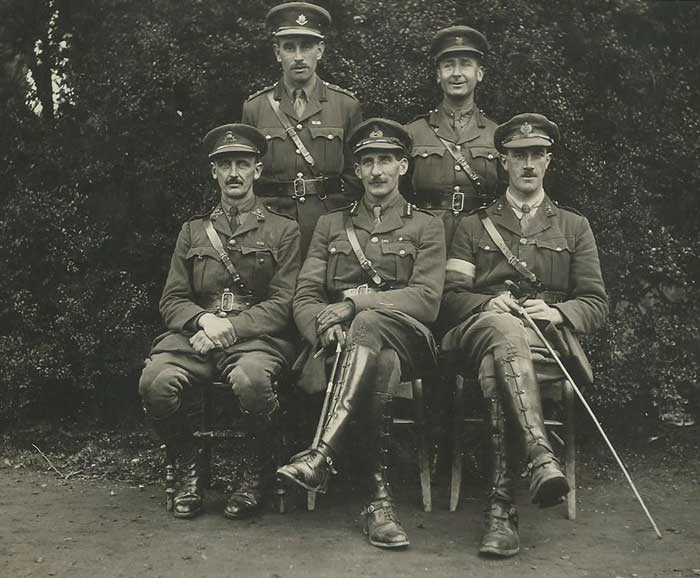 In addition to "Far Bugles", quoted
from above, there is considerable information
available about the 15th Battalion and the two
other "Birmingham Pals" battalions, the 14th and
16th, in Terry Carter's book "The Birmingham Pals"
(Pen & Sword Military, 2011).
In addition to "Far Bugles", quoted
from above, there is considerable information
available about the 15th Battalion and the two
other "Birmingham Pals" battalions, the 14th and
16th, in Terry Carter's book "The Birmingham Pals"
(Pen & Sword Military, 2011).
It
appears that Frank relinquished his role of
Battalion Adjutant in April 1917 when he was
transferred to the General List (reported in the
Birmingham Daily Post on Friday 8th June 1917).
And notice of his award of the Military Cross
appeared in the London Gazette on 1st January
1918.
|
************************** |
Frank Liddell preserved a few
further fragments of his life in the Great War
which were kept in a scrapbook. They all relate to
times of leisure and give an impression of
creativity and humour at a time when the period of
death and destruction was finally drawing to a
close.
The front and rear of a leaflet,
perhaps the programme of an entertainment or a
Mess dinner, bearing the signature of Frank
Liddell (with a nickname, "Peter", an in-joke
which is now lost to us) and those of fellow
officers. Perhaps the latter were members of his
staff.
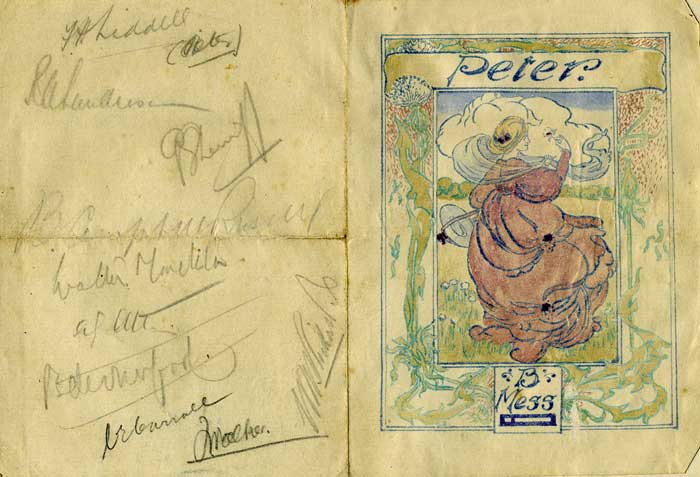 Amongst the signatures is one which
appears to be "Walter M*****", perhaps "Walter
Meredith". Is he the poet whose work Frank Liddell
felt well worth preserving for decades after the
end of the war, and until the very end of his
life? Here are the three examples, composed
in Martigny in October 1918, written out as fair
copies and, presumably, presented to Frank. The
Peter reference is again present.
Amongst the signatures is one which
appears to be "Walter M*****", perhaps "Walter
Meredith". Is he the poet whose work Frank Liddell
felt well worth preserving for decades after the
end of the war, and until the very end of his
life? Here are the three examples, composed
in Martigny in October 1918, written out as fair
copies and, presumably, presented to Frank. The
Peter reference is again present.
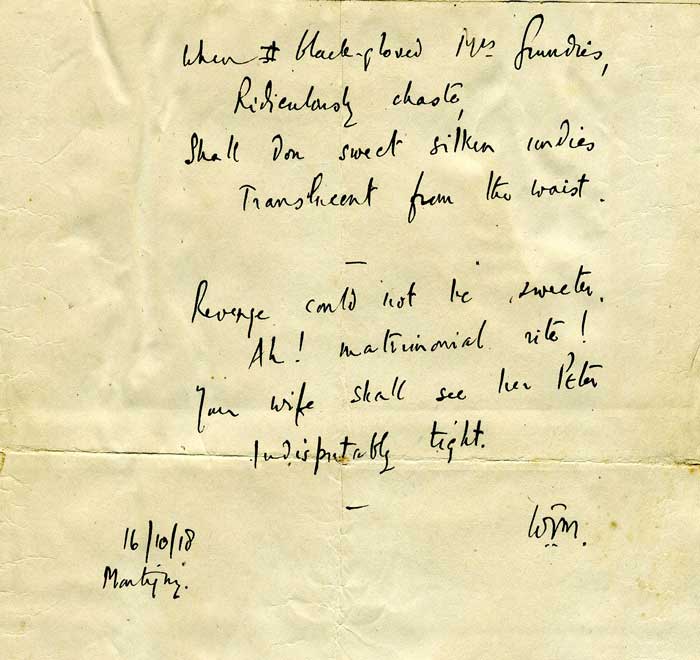 The following appears to be a (one
assumes) light-hearted reaction by someone who has
been passed over for promotion or has been
replaced. It seems to be addressed to Frank
("Peter").
The following appears to be a (one
assumes) light-hearted reaction by someone who has
been passed over for promotion or has been
replaced. It seems to be addressed to Frank
("Peter").
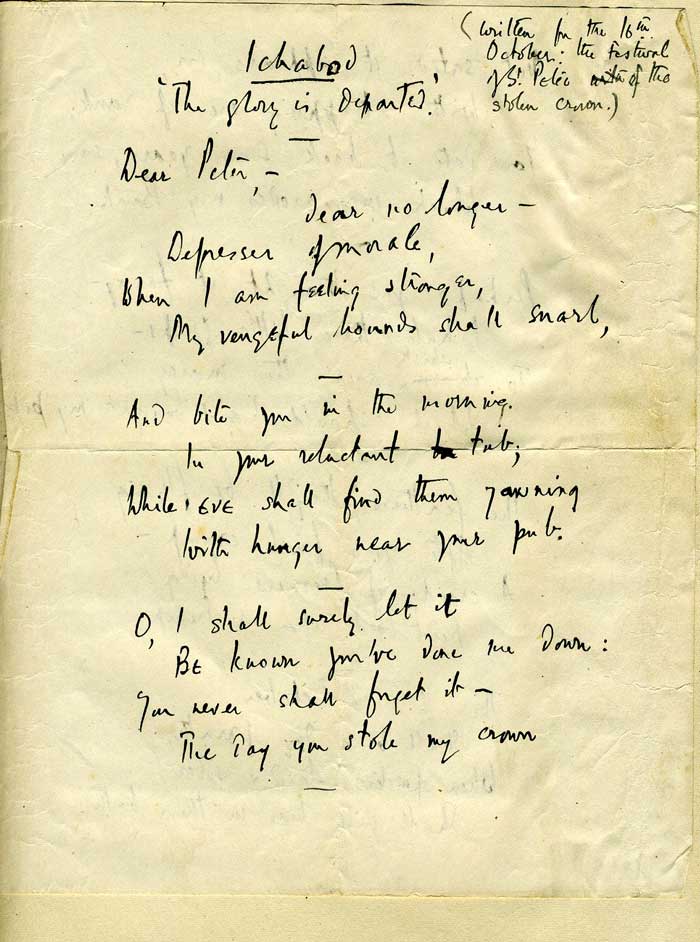
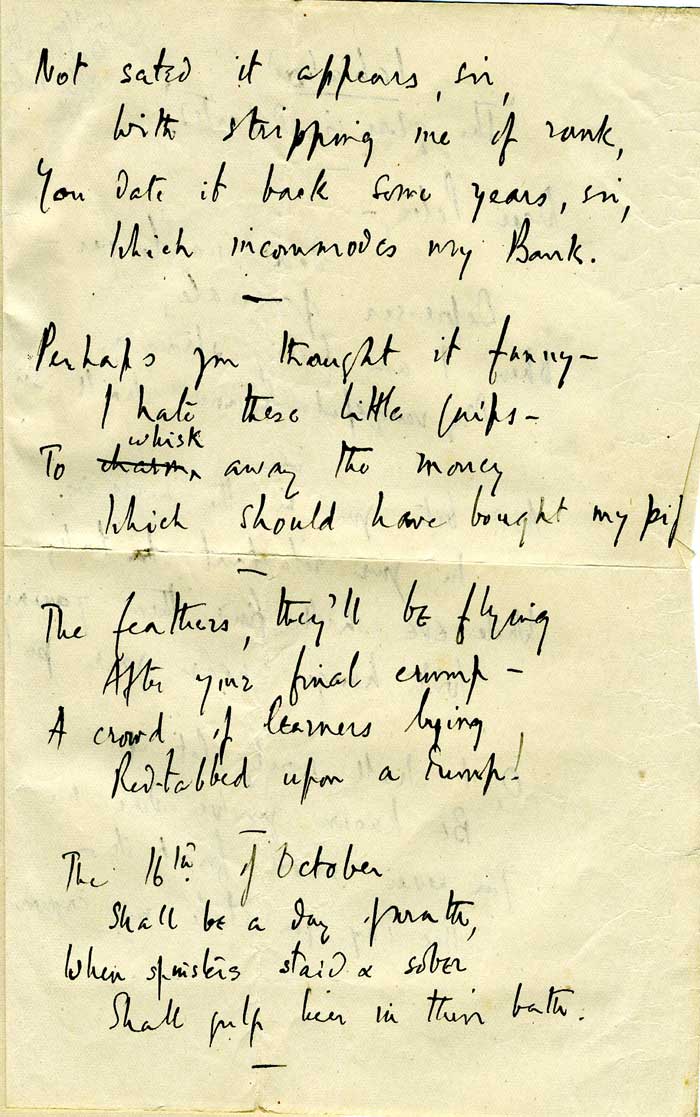 Something has changed overnight - "a
compromise".
Something has changed overnight - "a
compromise".
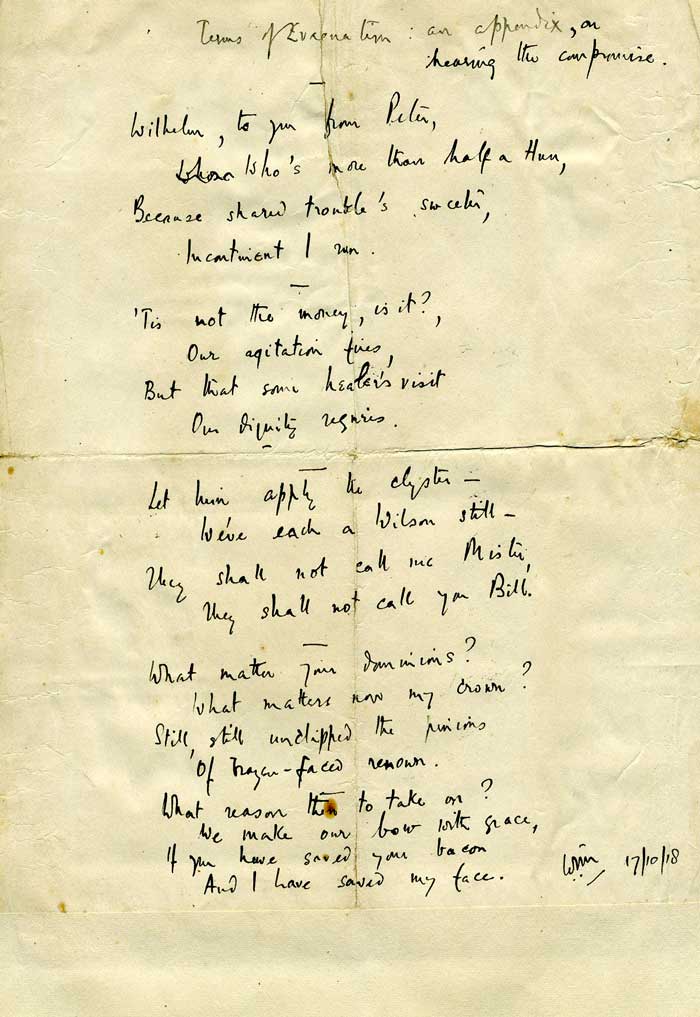 n.b.
"Clyster" is an
enema; the exact significance of "a Wilson" is
unknown but will be an oblique reference to the
American President. And is it Frank "who's more
than half a Hun?"
n.b.
"Clyster" is an
enema; the exact significance of "a Wilson" is
unknown but will be an oblique reference to the
American President. And is it Frank "who's more
than half a Hun?"
 He
married before the Armistice. This is the notice
from the Daily Post of 18th
February 1918. He
married before the Armistice. This is the notice
from the Daily Post of 18th
February 1918.
Frank Liddell survived
the Great War as so many of his brother officers
and men did not. He spent the rest of his life in
Shrewsbury where he owned the Della Porta department
store in High Street. In that town he was a leading member of the
community for decades - before, during and after
the Second World War - and for four years commanded
the 1st Shropshire Battalion
of the Home Guard.
In Memory of
Lt.-Col. Frank H.
Liddell
and
all his comrades in the
1st Shropshire Battalion |
ACKNOWLEDGEMENT
Staffshomeguard is
most grateful to Mandy Peat, Col. Liddell's
grand-daughter, for generously passing on
images and information about her grandfather
and permitting their publication in this
website; and to Terry Carter for information
from the London Gazette and contemporary
newspapers.
FURTHER
INFORMATION
Further information about the
Home Guard in Shrewsbury is contained
elsewhere in various parts of this website. To view the
Shropshire summary page, please use the
Shropshire Page link below.
And if you
can add anything to the history of the
Shropshire Home
Guard, please contact staffshomeguard via the
Feedback link.
|
|
x119B June 2015 |
|